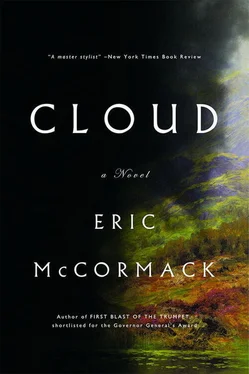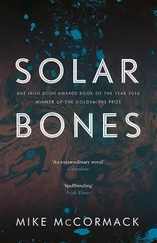As I sat at the bar with my drink, he talked to me about himself and the hotel. His name was Joe; he was an American with a slow drawl that no doubt suited the pace of life in Oluba. He’d been a soldier down here during the Second World War and had liked the place so much he came back permanently when the fighting was over.
“The hotel belongs to Anata,” he said. “She’s in the kitchen cooking tonight’s dinner.”
He was also very interested to hear about my connection to Smith’s Pumps.
“I know Smith’s Pumps,” he said. “Gordon Smith used to come down here. We haven’t seen him now in maybe twenty years.”
I told him that Gordon had actually been dead for eighteen years.
“Gordon’s dead?” He seemed shocked. “Well, I’m sorry to hear that.”
He turned and called out into the dining room in the local language. A grey-haired island woman emerged from inside and joined us.
This was Anata, the owner of the Mango Tree Hotel, and she certainly made an interesting first impression. She had long grey hair, and her face and bare shoulders and arms were completely covered in tattoos of what appeared to be vines, lianas, and tropical plants. These tattooed plants seemed to be wilting with age, like Anata herself. She wore a kind of sarong that was slit from ankle to thigh, so I could see that her legs were also tattooed with vegetation. Those legs looked remarkably muscular for a woman past the prime of life.
Joe spoke quietly to her in the local language. Gordon’s name was mentioned several times.
She looked shocked at what he’d said. She turned to me and began to talk quickly in her own language. What with the tattoos all over her face, it was almost as if she was talking from behind a potted plant. Of course, I couldn’t understand what she was saying, though again I heard Gordon’s name.
When she’d finished, Joe gave me the very briefest of translations.
“She’s very upset to hear about Gordon,” he said. “He was very generous to her.”
He would have said more but just then a half-dozen or so other diners appeared — apparently, sailors from one of the freighters anchored off shore. Joe had to turn his attention to bartender duties for the new guests and Anata had to get back to her cooking.
THE DINNER CONSISTED of fresh fish from the lagoon, washed down with palm wine. The latter was surprisingly pleasant tasting, and I had a little bit too much. The sailors at the other tables were drinking it, and getting quite rowdy, so I went back to my room. I was tired after my sleepless night on the voyage, so I thought I’d read for a while then get to bed early.
Before I could even open my book, though, the lamp had attracted mosquitoes and the little biting insects they called nonos in Fiji. So I undressed and got into bed under the mosquito net with the book, Unveiling the Islands . I’d found it in a bookstore in Suva and was attracted to it because the cover mentioned that it dealt with Oluba and was written by one of the first Western travellers there, an anthropologist named Ireneus Fludd.
In the first chapter, Fludd talks about the pervasive use of tattoos, especially amongst the Oluban women. He attributes the practice to a vegetation and fertility cult that was widespread in the region. He also makes particular mention of the women’s legs:
Muscular legs are regarded as most desirable attributes amongst the Oluban women. As I walked along the beach on my first days on the island, I observed the male islanders mending their fishing nets and the woven sails of their outrigger canoes. But much more fascinating was to see the women of all ages doing vigorous knee bends and other leg exercises. Upon my inquiry, one of the Oluban chiefs explained that the exercise was for the rite of
paratac
, a word unfamiliar to me at that time.
Fludd was soon to discover both the meaning of that word and the purpose of those leg-strengthening routines.
He’d been invited by the Oluban chief to attend a banquet. When the festivities were over, the chief, following an Oluban custom to help make strangers feel at home, presented him with one of his daughters as a temporary gift.
The chief’s daughter took him to a nearby dwelling place. Inside, about five feet above the floor, a thick wooden beam had been erected in the manner of a horizontal training bar used in gymnastics.
Fludd faithfully records what happened there:
She divested herself of her sarong and, with an acrobatic move, she hooked her legs over that heavy beam and hung there upside down, her black hair dangling to the floor. She held out her arms to me, then slowly lifted me up by the waist, her own great legs taking the combined weight of us both, and turned me upside down till we were face to face. In this position, she inserted me into her and clung to me.
“Paratac,”
she said.
She began gently to swing back and forth, back and forth, causing me to move, by the law of gravity, up and down, up and down.
Soon she was gasping and howling words in her own language. I felt I ought to participate so I began shouting appropriate words in English. My vocal participation seemed to rouse her even more, which, I feel I must confess, aroused me still more.
After a brief frenzy, we dangled silently. Then she slowly turned me upright again, lowered me to the ground, and unhooked herself. I understood that
paratac
was finished.
I looked from the book up to that beam over my bed. Surely it must have been put there originally for the purposes of paratac . The whole exercise, as described by Fludd, sounded anything but enticing.
I went back to my reading. The next chapters in Fludd’s book consisted of rather technical analyses of the complex system of totems espoused by the Olubans. That acrobatic sex act of paratac , for example, was itself totemic: it mimicked the behaviour of fruit bats, which Fludd said he himself thereafter observed propagating upside down in the heights of coconut palms.
These technical chapters were, no doubt, the kinds of things an anthropologist might savour. But for me, lying there sweating under the mosquito net, exhausted from my journey, drowsy both from the palm wine and the effort of trying to keep my eyes open, they were too much. I gave up the effort, switched off the lamp, and fell asleep.
The next morning, I showered and dressed for the business that had brought me here: my meeting with representatives of Bird Island Phosphates. The island was actually a hundred miles south of Oluba itself, but to spare me another sea voyage, the manager and the chief engineer had come to Oluba’s harbour. We were to conduct our business on the company vessel before they caught the noon tide back to Bird Island.
I strolled down to the harbour and realized that the company boat was none other than that expensive-looking motor yacht I’d noticed tied up at dock. The manager of Bird Island Phosphates and his engineer welcomed me aboard. Both were Englishmen of about my own age and appeared to be good friends. Our meeting was held under the deck awning.
That morning it was low tide and the lagoon was shallow, with weeds and corals protruding. The air was full of the strong smell of rotting vegetation as well as whatever other dead things lay exposed to the sun. In the distance we could see the surf breaking on the reef against a backdrop of the endless dark blue of the ocean.
The engineer had brought photographs of the two pumps Gordon had sold the phosphate company so long ago. They were an early model and the cylinder blocks and valve plates were very worn, which meant the pistons were no longer able to function with much efficiency.
From the engineer’s comments it was clear that he was hoping the old pumps couldn’t be repaired. He devoted much of his time on Bird Island trying to keep them running but felt it was now becoming a losing battle. He’d seen our recent catalogue and was keen on buying new pumps. Either way, a decision had to be made quickly. The pumps were vital because much of the phosphate was beneath sea level and the diggings were prone to flooding.
Читать дальше











